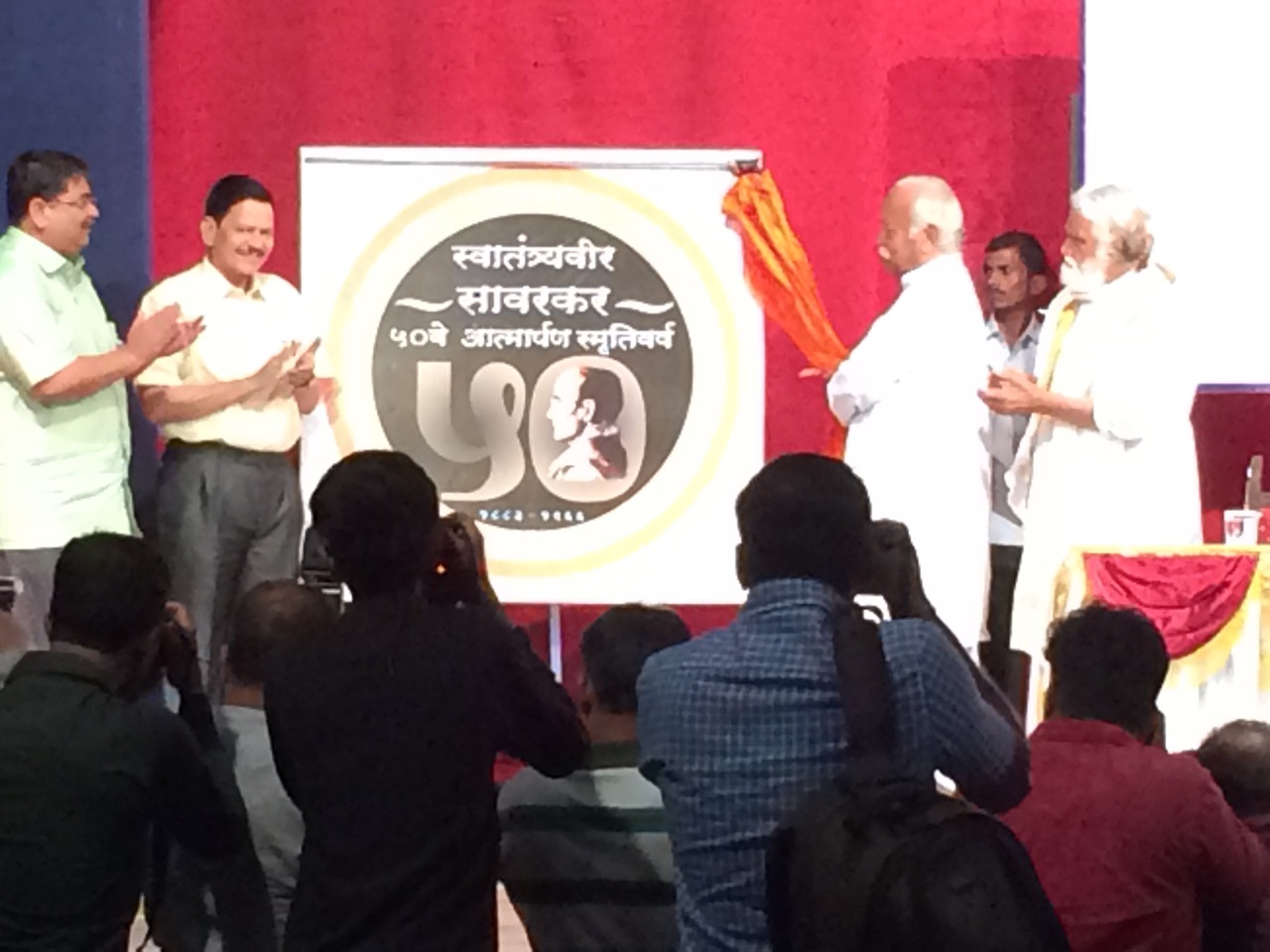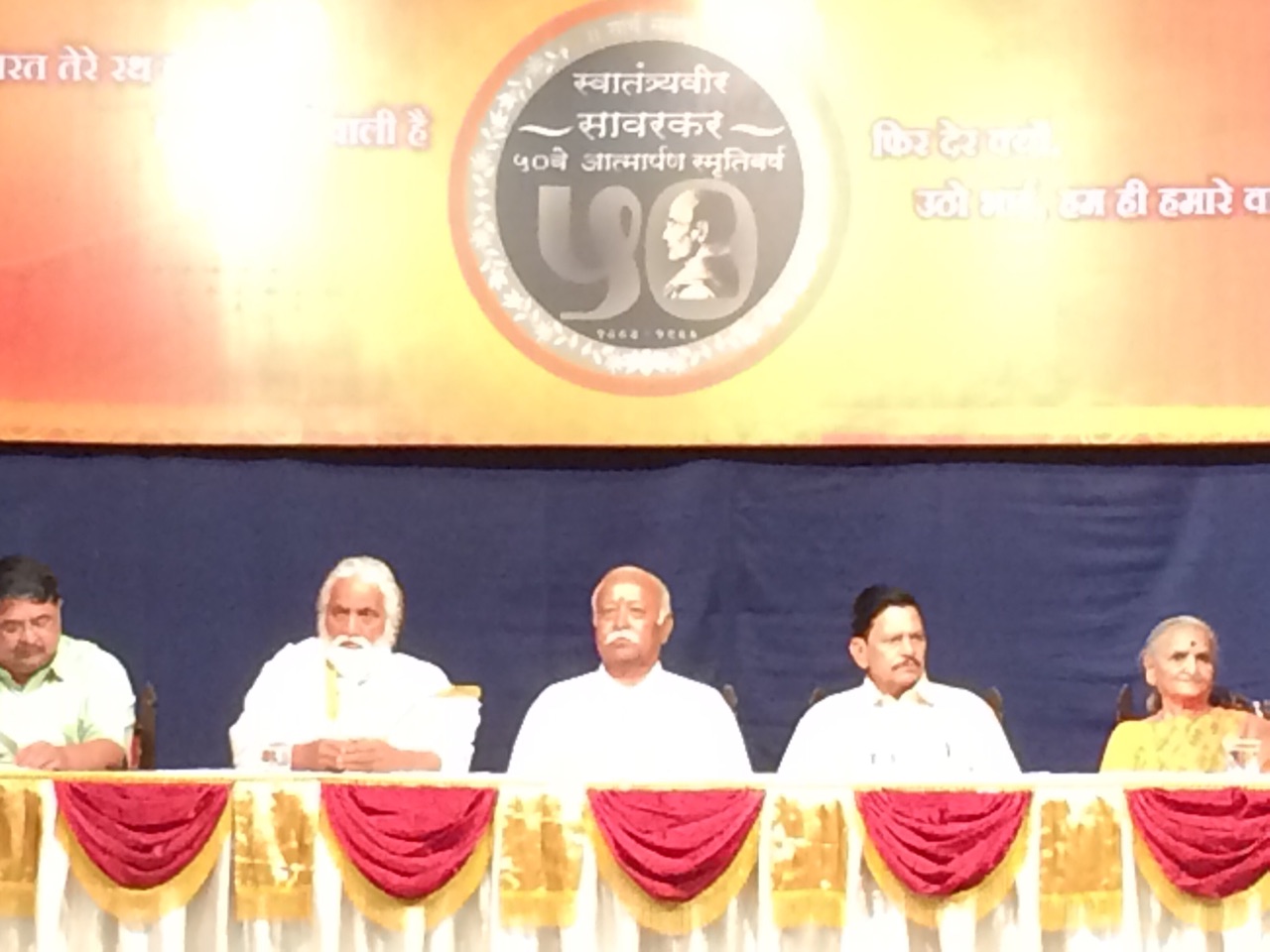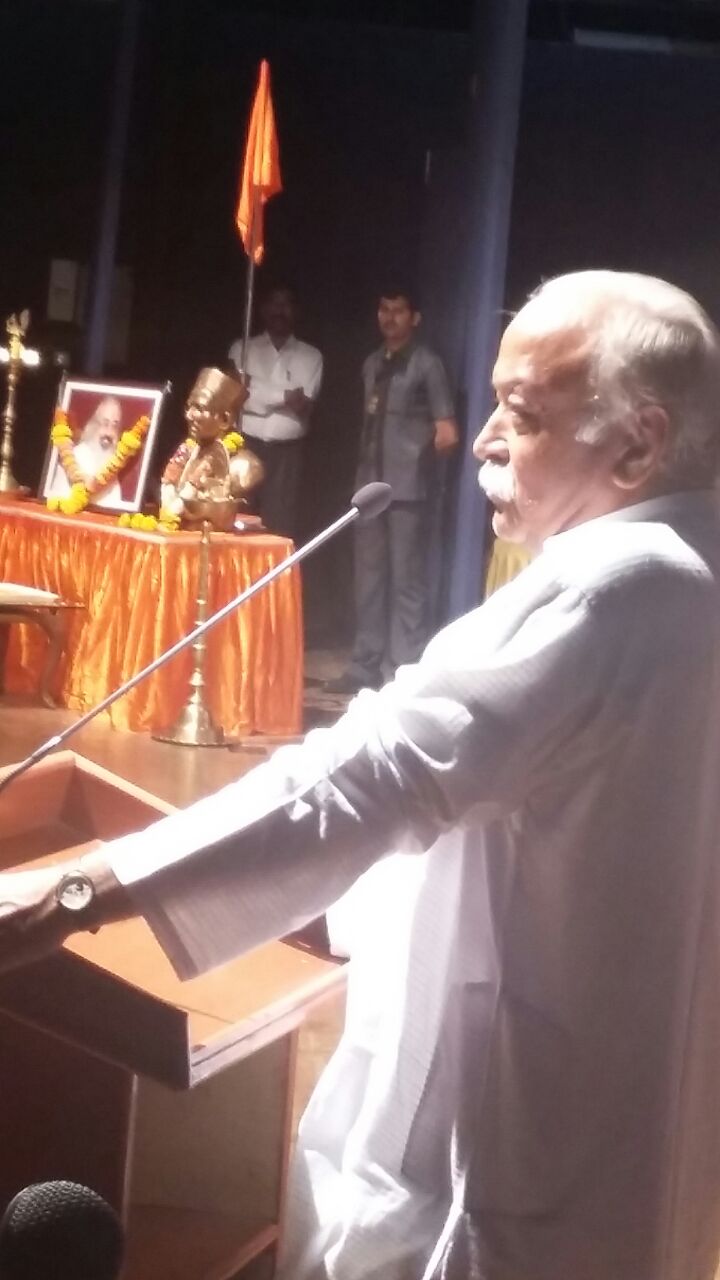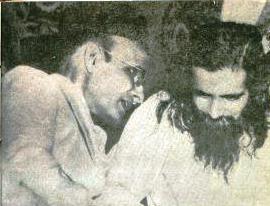21-23 APR 2017 29 AKHILBHARTIYA SAVARKAR SAHITYA SAMMELAN
२९ व्या अखिल भारतीय सावरकर साहित्य संमेलनाला आज ठाण्यात सुरूवात
ग्रंथदिंडी काढून संमेलनाला सुरूवात
लोकसत्ता ऑनलाइन | Updated: April 21, 2017 8:10 PM

२९ व्या अखिल भारतीय सावरकर साहित्य संमेलनाला ठाण्यात सुरूवात
ठाणे : २९ व्या अखिल भारतीय सावरकर साहित्य संमेलनाला आजपासून सुरूवात झाली आहे. हे संमेलन २१ एप्रिलपासून ते २३ एप्रिलपर्यंत सुरू राहणार आहे. संमेलनाच्या उदघाटनापूर्वी ठाण्यातील सावरकर प्रेमी संघटनांच्या वतीने तसेच ठाण्यातील विविध सामाजिक तसेच शैक्षणिक संस्थांनी ग्रंथदिंडी काढली. या दिंडीत ठाणेकर नागरिकांबरोबरच शालेय विद्यार्थीदेखील ढोल ताशाच्या गजरात सहभागी झाले होते. या दिंडीत सावरकरांचं साहित्य ठेवण्यात आले होते. ठाण्यातील भगवती शाळेपासून सुरू झालेली ही दिंडी गडकरी रंगायतन येथे संपली.
ठाण्यात आजपासून सुरु झालेल्या २९ व्या सावरकर साहित्य संमेलनासाठी ठाणे नगरी सज्ज झाली असतानाच दुसरीकडे सावरकरांच्या विचारांवर चालणाऱ्या ठाण्यातील नागरिकांनी स्वातंत्रवीर सावरकर यांनी लिहलेली पुस्तकं तसेच ग्रंथांची पालखी काढली होती. यामध्ये विविध संस्थांचे चित्र रथही सहभागी झाले होते. मुंबईमधील सावरकर दर्शन प्रतिष्ठानचा चित्ररथही सहभागी झाला होता. ठाण्यातील नौपाडा परिसरातील भगवती शाळेकडून सुरू झालेली ही दिंडी विष्णूनगर, घंटाळी चौक मार्गे, राम मारुती रोड, तलावपाळी मार्गाने गडकरी रंगायतन येथे येऊन दिडींची सांगता करण्यात आली. ठाण्यात पहिल्यांदाच अखिल भारतीय सावरकर साहित्य संमेलन आयोजित करण्यात आले आहे.
उद्या शनिवारी २२ एप्रिलला सावरकरांचं साहित्य विश्व यावर डॉ. सदानंद मोरे परिसंवाद कार्यक्रमात सहभागी होणार आहेत. तर रविवार २३ एप्रिल सावरकरांवरील आक्षेप व निराकरण या परिसंवादात डॉ. श्रीरंग गोडबोले सहभागी होणार आहेत. या कार्यक्रमाची सांगता शिवसेना पक्षप्रमुख उध्दव ठाकरे यांच्या हस्ते होणार आहे. यावेळी पालक मंत्री एकनाथ शिंदे, शिक्षण व सांस्कृतिक मंत्री विनोद तावडे आदी मान्यवर उपस्थित राहणार आहेत.
First Published on April 21, 2017 8:10 pm
Web Title: 29th Akhil Bhartiya Savarkar Sahitya Sammelan Started In Thane
“Swatantryaveer” Savarkar – Iconic Revolutionary’s Honor Restored at ‘Andaman’ By Modi Govt
On May 28, 2016 when Bharat was celebrating another successful year of PM Modi’s ever progressive administration, a unique ceremony was unfolding hundreds of miles from its shores at ‘Central Cellular Jail’ of Port Blair in Andaman Islands.

On this day, in presence of Amit Shah, President of BJP and other dignitaries, the long awaited honor of one of Bharat’s greatest freedom fighters– Vinayak Damodar Savarkar, popularly known asSwatantryaveer Savarkar was once again being restored.
It was not only a tribute to his sacrifices for Bharat, but also, to his pioneering social efforts to build a nationalistic unified society. It was also the 133rd birth anniversary of this iconic revolutionary.

By rededicating ‘Veer Savarkar Jyot’ on this day, PM Modi was rewriting a dark hurtful episode that created a national fire-storm, a decade earlier. Then, the Congress Minister Mani Shankar Aiyar, as an appeasement to his leadership had misguidedly removed the Plaque dedicated to Savarkar from the ‘Memorial for Bharatiya Revolutionaries’ at the Cellular Jail and replaced it with the one for Mahatma Gandhi.
The fact of the matter is, though Mahatma Gandhi was an iconic freedom fighter, he was not a revolutionary (‘Krantikaari’) nor had he ever been into Andaman’s draconic ‘kala-paani’ Jail. With this event, PM Modi also fulfilled the promise he had made to the electorates.
Port Blair Airport of Andaman Islands was already named as ‘Veer Savarkar International Airport’ by former PM Vajpayee during his administration. It is worth assessing why Savarkar has a place of reverence in Bharat’s history.
In the galaxy of Bharatiya revolutionaries, the words ‘Swatantryaveer’ and ‘Savarkar’ are almost synonymous with each other. Born on May 28, 1883, he was so much consumed with passion to liberate Bharat from British rule that at the tender age of 8, he took the oath to liberate his country with all possible means and to fight for it till the end.
While studying Law (Barrister) in London on scholarship, he not only sowed the seeds of Independence-movement among the Bharatiya students studying there, but also created an international support forum for it.
It was there that he wrote his ground-breaking famous book “1857 – First War of Independence” on an epic historic chapter of collective bravery of Princely states of Bharat to overthrow the British Raj. Savarkar, with his painstaking research, showed to the world that this entire episode which the British had derided as nothing short of a ‘Sepoy Mutiny’, was in fact the most courageous effort of gallantry to liberate the country. At the time, this book had the distinction of being proscribed (banished) by two governments, even before it was published.
This fearless patriot shook the mighty British rule in Bharat so much so that he was sentenced to two life-terms of 25 years each on trumped-up charges for his relentless activities against the British-Raj. Savarkar’s dramatic daring escape to the shores of Marseilles, France from the porthole of the ship that was to carry him to Bharat for the trial is now a part of heroic folklore.
His subsequent arrest by the British on French soil became cause-célèbre in the International Court of Law at Hague setting the stage for the then French government to topple. At his trial, where he was denied all personal representation, Savarkar, on hearing his sentence courageously rebuked the Judge with, “what makes you think that you are going to last that long in my motherland”. That is exactly what happened. Savarkar went on to live in Free Bharat for years to come.
Madanlal Dhingra, Netaji Subhash Chandra Bose, Chandra Shekhar Azad, Shaheed Bhagat Singh and scores of others took counseling and inspiration from him during the Independence Struggle. He was the first political leader to demand absolute political independence for Bharat – not just independence – as the only goal for the country’s liberation.
Savarkar remains the only Bharatiya to forfeit his degree of ‘Barrister’ because of his refusal to take the pledge of allegiance to the British throne. He was not only a gifted writer, inspiring orator, outstanding poet-dramatist, but also a comprehensive social reformer. He created an active crusade against untouchability and religious demagoguery. As a brilliant visionary, Savarkar’s prophesies of the pre-independence period are now modern-day Bharat’s stark sociopolitical realities.
Savarkar was the ultimate prince among all revolutionaries and spent a decade in Anadaman’s Cellular Jail in the most inhuman conditions. In spite of that, the British could not break his morale or his will to fight the British Raj. Within the walls of the gigantic Cellular Jail, Savarkar continued his work of eradicating untouchability and illiteracy among the prisoners to unify them.
One must read his famous book, ‘My Life Sentence’ (“Mazi Janmthep”) to know what he endured and what he achieved even in this adversity. As Savarkar’s written words, including his poems were like live-wire to ignite fire of independence in the hearts of Bharatiyas, he was denied paper, pen-pencil in the Andaman prison. Savarkar triumphed over this inconvenience by writing his poems on the prison walls by thorns and making the prisoners memorize them whenever someone was to be released.
This is how his inspiring work was transported to the underground resistance in Bharat for nationwide circulation. In this captivity, his greatest creation – 10,000 stanzas ‘Kamala- Mahakavya’ – the lengthiest poem ever written in the world – was born.
For creating a mass movement for freedom struggle, Savarkar established “Hindu Mahasabha” which became one of the leading political forces at the time.
Savarkar’s intellectualism was based solely on Science and Technology, rather than on ritualistic religious notions. Needless to say, his views, at times, were contrarian to age-old Hindu dogmas. He initiated and propagated the concept of ‘Hindutva’ as the primary identity of ‘Bharatbhoomi’, giving rise to ‘Hindu Nationalism’. He defined it, fundamentally in terms of the nation’s consciousness, its cultural soul and eternal heritage – but not in religious terms.
He gave self-esteem, national identity, and unflinching courage to ‘Bharitiya nationalists’. Not many people know that Savarkar has been a political guiding light in the life of Hon. PM Modi all along, like many generations before him. Savarkar left this mortal world on February 26, 1966 by refusing to have any food in his last days, in the best traditions of yogic Hindu philosophy.
(Disclaimer: This article represents the opinions of the Author, and the Author is responsible for ensuring the factual veracity of the content. HinduPost is not responsible for the accuracy, completeness, suitability, or validity of any information, contained herein.)
RSS Sarasanghachalak Bhagwat inaugurates Veer Savarkar’s 50th Punyatithi Smruti Varsh Ceremony in Mumbai
Date posted: February 26, 2015 | Short URL: http://samvada.org/?p=25107 | Share:

Mumbai February 26: RSS Sarasanghachalak Mohan Bhagwat inaugurated 50th Punyatithi SmrutiVarsh ceremony, remembering the legacy of great freedom Fighter Swatantrya Veer Vinayak Damodar Savarkar in Dadar Mumbai on Thursday evening.
RSS Sarasanghachalak Mohan Bhagwat said,” accepting diversity has been a unique quality of Indians”.
In his speech in Marathi, Bhagwat said “Dharma does not mean puja. It is a combination of character and responsibilities, We never forced anyone to change their worship habits”.
Mohan Bhagwat applauded Veer Savarkar for his fierce nationalism, Bhagwat bemoaned that the country did little to recognise his contribution to nation-building. “What did we, the society give Savarkar? He was dragged into a shameful court case after the Independence. Savarkar’s plaque at the Cellular Jail at Andamans was also removed,” he said.
Former minister from Vidarbha, Jambuwantrao Dhote, who also spoke, said, “Most of the Christians and Muslims here were originally Hindus.”
Veer Savarkar had close association with RSS, especially MS Golwalkar, the second RSS Sarasanghachalak.
Vinayak Damodar Savarkar:
Vinayak Damodar Savarkar (28 May 1883 – 26 February 1966) was an Indian pro-independence activist, politician as well as a poet, writer and playwright. He advocated dismantling the system of caste in Hindu culture, and reconversion of the converted Hindus back to Hindu religion. Savarkar created the term Hindutva, and emphasised its distinctiveness from Hinduism which he associated with social and political communalism. The stated aim of Savarkar’s Hindutva was to create an inclusive collective identity. The five elements of his philosophy were Utilitarianism, Rationalism and Positivism, Humanism and Universalism, Pragmatism and Realism.
Savarkar’s revolutionary activities began while studying in India and England, where he was associated with the India House and founded student societies including Abhinav Bharat Society and the Free India Society, as well as publications espousing the cause of complete Indian independence by revolutionary means. Savarkar published The Indian War of Independence about the Indian rebellion of 1857 that was banned by British authorities. He was arrested in 1910 for his connections with the revolutionary groupIndia House. Following a failed attempt to escape while being transported from Marseilles, Savarkar was sentenced to two life terms of imprisonment totalling fifty years and was moved to the Cellular Jail in the Andaman and Nicobar Islands, but released in 1921.
While in jail, Savarkar wrote the work describing Hindutva, openly espousing Hindu nationalism. In 1921, under restrictions after signing a plea for clemency, he was released on the condition that he renounce revolutionary activities. Travelling widely, Savarkar became a forceful orator and writer, advocating Hindu political and social unity. Serving as the president of the Hindu Mahasabha, Savarkar endorsed the ideal of India as a Hindu Rashtra and opposed the Quit India struggle in 1942, calling it a “Quit India but keep your army” movement. He became a fierce critic of the Indian National Congress and its acceptance of India’s partition. He was one of those accused in the assassination of Indian leader Mohandas Karamchand Gandhi and was acquitted in the trial.
The airport at Port Blair, Andaman and Nicobar’s capital, has been named Veer Savarkar International Airport. The commemorative blue plaque on India House fixed by the Historic Building and Monuments Commission for England reads “Vinayak Damodar Savarkar 1883-1966 Indian patriot and philosopher lived here”
Vinayak Damodar Savarkar, commonly known as Swatantryaveer Savarkar was a fearless freedom fighter, social reformer, writer, dramatist, poet, historian, political leader and philosopher. He remains largely unknown to the masses because of the vicious propaganda against him and misunderstanding around him that has been created over several decades. This website attempts to bring the life, thought, actions and relevance of Savarkar before a global audience.
- The first political leader to daringly set Absolute Political Independence as India’s goal (1900).
- The first Indian political leader to daringly perform a bonfire of foreign (English) clothes (1905).
- The first Indian to organize a revolutionary movement for India’s Independence on an international level (1906).
- The first Indian law student who was not called to the English Bar despite having passed his examination and observed the necessary formalities, for his activities to seek India’s freedom from the British (1909).
- The only Indian leader whose arrest in London caused legal difficulties for British Courts and whose case is still referred to in the interpretations of the Fugitive Offenders Act and the Habeas Corpus (Rex Vs Governor of Brixton Prison, ex-parte Savarkar)
- The first Indian historian whose book on the 1857 War of Independence was proscribed by British Authorities in India even before its publication. The Governor General had asked the Postmaster General to confiscate copies of the book six months before the book was officially banned (1909).
- The first political prisoner whose daring escape and arrest on French soil became a cause celebre in the International Court of Justice at The Hague. This case was mentioned in many International Treaties at that time (1910).
- The first graduate whose degree was withdrawn by an Indian University for striving for India’s freedom (1911).
- The first poet in the world who, deprived of pen and paper, composed his poems and then wrote them on the prison walls with thorns and nails, memorized ten thousand lines of his poetry for years and later transmitted them to India through his fellow-prisoners who also memorized these lines.
- The first revolutionary leader who within less than 10 years gave a death-blow to the practice of untouchability in the remote district of Ratnagiri while being interned there.
- The first Indian leader who successfully started –
- A Ganeshotsava open to all Hindus including ex-untouchables (1930).
- Interdining ceremonies of all Hindus including ex-untouchables (1931).
- “Patitpavan Mandir”, open to all Hindus including ex-untouchables (22 February 1931).
- A cafe open to all Hindus including ex-untouchables (01 May 1933).
- The first political prisoner in the world who was sentenced to Transportation for Life twice, a sentence unparalleled in the history of the British Empire.
- The first political leader to embrace death voluntarily by way of Atma Samarpan in the highest tradition of Yoga (1966).
Search Results
स्वातंत्र्यवीर वि दा सावरकर अभिवादन यात्रा २०१३ ...
https://www.youtube.com/watch?v=a0Uh8VJ1ZlY
Jan 9, 2014 - Uploaded by श्री.उपेंद्र पंढरीनाथ सामंत
सेल्युलर जेल -अंदमान द्वीप समूह दर्शन दिनांक १३ नोव्हेंबर २०१३ ते २३ नोव्हेंबर २०१३.सेल्युलर जेल अंदमान सावरकर अभिवादन यात्रा २०१३ ...
https://www.youtube.com/watch?v=7g-QmdtNAPI
Jan 31, 2014 - Uploaded by श्री.उपेंद्र पंढरीनाथ सामंत
सेल्युलर जेल अंदमान सावरकर अभिवादन यात्रा २०१३ ... Veer Sawarkar by Avinash Dharmadhikari part 1Marathi(वीर सावरकर - अ.Veer Savarkar's Cell at Kala Pani, Cellular Jail, Port Blair - YouTube
https://www.youtube.com/watch?v=J-9BAzYksr0
Mar 10, 2012 - Uploaded by indiavideodotorg
Veer Savarkar, a famous freedom fighter of India, was imprisoned in Cellular Jailat Port Blair. For more ...स्वातंत्र्यवीर वि दा सावरकर अभिवादन यात्रा २०१३ ...
https://www.youtube.com/watch?v=idTKIfze7ZA
Dec 2, 2013 - Uploaded by श्री.उपेंद्र पंढरीनाथ सामंत
स्वातंत्र्यवीर वि दा सावरकर अभिवादन यात्रा २०१३ .... सेल्युलर जेल -अंदमान द्वीप समूह दर्शन दिनांक १३ ...Savarkar is imprisoned at the Cellular Jail, Andaman Islands - YouTube
https://www.youtube.com/watch?v=GipbwulnFIQ
Sep 4, 2013 - Uploaded by WhoKilledGandhi
July 4, 1911. Savarkar is imprisoned in the notorious, maximum security CellularJail deep in the remote ...Amit Shah unveiled Veer Savarkar jyot at Cellular Jail - YouTube
https://www.youtube.com/watch?v=KGdS_Qn78qE
May 28, 2016 - Uploaded by Andaman Live
Up next. Shri Amit Shah unveiled Savarkar Jyot at Cellular Jail, Port Blair (28 May 2016) - Duration: 20:15 ...Cellular Jail Savarkar Andaman & Nicobar Kaala Pani - Real Story of ...
https://www.youtube.com/watch?v=jHXZMNjitZA
Mar 9, 2012 - Uploaded by makwana78
Do you know that before Cellular Jail - Britishers use to execute F.. ... Cellular JailSavarkar Andaman ...Savarkar is released from Andman Island's Cellular Jail, Kala Paani ...
https://www.youtube.com/watch?v=-X0D6P75py8
Sep 4, 2013 - Uploaded by WhoKilledGandhi
After demands from Gandhi and others for his release, Savarkar returns to a ... Savarkar is released from ...Andaman CELLULAR jail prison KALAPANI (SCARY) - YouTube
https://www.youtube.com/watch?v=mduQgwpjyyk
Jun 4, 2008 - Uploaded by Hemant Kumar Jha
Andamans Cellular jail Kalapani niki hemant jha prison. ... Veer Savarkar and Indian revolutionaries facing ...Kala Pani / Cellular Jail - ANDAMAN & NICOBAR - YouTube
https://www.youtube.com/watch?v=Q-GRzDie3BQ
Aug 16, 2010 - Uploaded by VIRASATPeaceOrg
The jail where freedom fighters (Political Prisoners)were kept untill death. ... Veer Savarkar and Indian ...
Stay up to date on results for swatantryaveer savarkar jail yatra.
Create alert
Showing results for swatantryaveer savarkar jail yatra
Search instead for swatantraveer savarkar jail yatra
Search instead for swatantraveer savarkar jail yatra
Search Results
Isha Tours | Veer Sawarkar Smaranyatra
www.ishatours.net/andaman-sawarkar-smaranyatra/
Cellular Jail; Radhanagar beach; Kalapatthar Beach; Ross Island; Chidiya ... Jai (Vinayak Damodar Savarkar - Wikipedia
https://en.wikipedia.org/wiki/Vinayak_Damodar_Savarkar
Vinayak Damodar Savarkar ( About this sound pronunciation (help·info)) (28 May 1883 – 26 ... While injail, Savarkar wrote the work describing Hindutva, espousing Hindu nationalism. In 1921, under restrictions ... The airport at Port Blair, Andaman and Nicobar's capital, has been named Veer SavarkarInternational Airport.
Missing: yatra
विनायक दामोदर सावरकर - विकिपीडिया
https://hi.wikipedia.org/wiki/विनायक_दामोदर_सावरकर
Translate this page
सावरकर ४ जुलाई, १९११ से २१ मई, १९२१ तक पोर्ट ब्लेयर की जेल में रहे। .... व्यवसाय निषेध; सिंधुबंदी: सागरपार यात्रा, व्यवसाय निषेध .... उपन्यास का हिन्दी रूपान्तर; Veer Savarkar movie on youtube in 19 ...स्वातंत्र्यवीर वि दा सावरकर अभिवादन यात्रा २०१३ ...
https://www.youtube.com/watch?v=a0Uh8VJ1ZlY
Jan 9, 2014 - Uploaded by श्री.उपेंद्र पंढरीनाथ सामंत
सेल्युलर जेल -अंदमान द्वीप समूह दर्शन दिनांक १३ नोव्हेंबर २०१३ ते २३ नोव्हेंबर २०१३.RSS Sarasanghachalak Bhagwat inaugurates Veer Savarkar's 50th ...
samvada.org/2015/news/bhagwat-at-inaugurates-savarkars-smruti-varsh-ceremony/
Feb 26, 2015 - Savarkar's plaque at the Cellular Jail at Andamans was also removed,” he said ... Veer Savarkar had close association with RSS, especially MS ...50 Years On: Who was the real Veer Savarkar? - Rediff.com India News
www.rediff.com › News
Feb 26, 2016 - Vinayak Damodar 'Veer' Savarkar's legacy, unfortunately, got mired in ... SVeer Savarkar- Cellular Jail | History Under Your Feet
https://historyunderyourfeet.wordpress.com/2016/05/28/veer-savarkar-cellular-jail/
May 28, 2016 - In my last post, I had explored Savarkar's arrest, epic escape at Marseilles . I now look at the most important phase in his life, the trial in India ...The mystery behind Veer Savarkar's escape from British custody ...
indiatoday.intoday.in › Magazine › NATION
Mar 1, 2013 - An NRI researcher has exposed a neatly maintained lie by the British government regarding the arrest of Vinayak Damodar Savarkar in France ...
Missing: yatra
Modi govt to reinstall Veer Savarkar's plaque at Andaman jail : North ...
indiatoday.intoday.in › India › North
Jun 1, 2015 - Sources have told India Today TV the plaque is likely to be installed again on July 4, the day Savarkar was jailed by the British during the ...
Missing: yatra
“Swatantryaveer" Savarkar – Iconic Revolutionary's Honor Restored at ...
www.hindupost.in/.../swatantryaveer-savarkar-iconic-revolutionarys-honor-restoredat...
Jul 1, 2016 - By rededicating 'Veer Savarkar Jyot' on this day, PM Modi was ... Within the walls of the gigantic Cellular Jail, Savarkar continued his work of ...Ads
Searches related to swatantryaveer savarkar jail yatra
Pune, Maharashtra - From your Internet address - Use precise location
Search Results
Amit Shah latest speech in Veer Savarkar Sahitaya sammelan in Thane
https://www.youtube.com/watch?v=_GdcfTb7qDk
2 days ago - Uploaded by Jan Gan Mann
BJP President Amit Shah latest speech on Veer Savarkar Sahitaya sammelan in ... Amit Shah latest speech in ...Amit Shah Speech at Veer Savarkar Sahitya Sammelan in Thane ...
https://www.youtube.com/watch?v=BIg35e2ts9Q
2 days ago - Uploaded by REPUBLIC OF INDIA
Amit Shah Speech at Veer Savarkar Sahitya Sammelan in Thane, ... 29:05. President Trump and First Lady ...Dhantedhan : Jayant Savarkar Interview on Natya Sammelan - YouTube
https://www.youtube.com/watch?v=lwWyxBKZGtA
22 hours ago - Uploaded by Abp Majha
For latest breaking news, other top stories log on to: http://abpmajha.abplive.in/ & https://www.youtube.com ...Vyakhyan on Savarkar - YouTube
https://www.youtube.com/watch?v=UGIOKSgBfwg
Nov 11, 2014 - Uploaded by Abhijeet Bhure
Vyakhyan on Savarkar. Abhijeet Bhure ... 3rd International SwatantryaveerSavarkar Sammelan ...Amit Shah addresses inaugural session of Veer Savarkar Sahitya ...
https://www.youtube.com/watch?v=KDsIL25iGEU
2 days ago - Uploaded by viral news
Amit Shah addresses inaugural session of Veer Savarkar Sahitya Sammelan in Thane, Maharashtra.Amit Shah is addressing the inaugural session of Veer Savarkar ...
https://www.youtube.com/watch?v=1Ma5djCQwPw
17 hours ago - Uploaded by indiapoliticalnews
Maharashtra : Amit Shah is addressing the inaugural session of Veer SavarkarSahitya Sammelan in Thane ...स्पर्धा असावी का? - YouTube
https://www.youtube.com/watch?v=Vc_c2Gzm00w
Jun 1, 2016 - Uploaded by Compete Prabodhini Way
3:29. 3rd International Swatantryaveer Savarkar Sammelan, London, 2013. ... Dr. Vinayak Damodar ...SlideShow-VEER SAVARKAR JYOT-Unveiling-Historical-Event ...
https://www.youtube.com/watch?v=USnCtemugiU
May 29, 2016 - Uploaded by edweepNews
Published on May 29, 2016. Unveiling of Veer Savarkar Jyot at Cellular Jail, Port Blair Port Blair, May 28: To ...वीर सावरकर पर Amit Shah का धमाकेदार भाषण ! Veer ... - YouTube
https://www.youtube.com/watch?v=knYOoYANKf4
2 days ago - Uploaded by Pyara Uttarakhand
वीर सावरकर पर Amit Shah का धमाकेदार भाषण ! Veer Savarkar Sahitya Sammelan in Thane, Maharashtra Like, Comment & ShareVishwa Marathi Natya Sammelan - Jayant Savarkar - YouTube
https://www.youtube.com/watch?v=J5VmJMm-cTM
Jun 2, 2010 - Uploaded by GlobalMarathi
3:03:29. Vishwa Marathi Natya Sammelan - Katyar - Duration: 8:54. GlobalMarathi 4,105 views. 8:54. Khupte ...
Stay up to date on results for 29 savarkar sammelan.
Create alertSearch Results
Amit Shah to open three-day Savarkar meet on April 21 | The Indian ...
indianexpress.com › India
Apr 12, 2017 - Amit Shah, BJP, BJP president, Savarkar Sahitya Sammelan, amit ... Shah will inaugurate the 29th Savarkar Sahitya Sammelan in Thane on ...Amit Shah at the inauguration of 29th Savarkar Sahitya Sammelan ...
https://dailyworld.in/amit-shah-at-the-inauguration-of-29th-savarkar-sahitya-sammelan/
2 days ago - Thane : BJP President Amit Shah at the inauguration of 29th Savarkar Sahitya Sammelanin Thane on Friday. /PTI ...29th Savarkar Sahitya Sammelan started in thane | सावरकर ... - Loksatta
www.loksatta.com › »
Translate this page
1 day ago - सावरकरांचे विचार रुजावेत या उद्देशाने दरवर्षी अखिल भारतीय सावरकर साहित्य संमेलनाचे आयोजन करण्यात ...29th akhil bhartiya savarkar sahitya sammelan started in thane | २९ ...
www.loksatta.com › »
Translate this page
2 days ago - ठाणे : २९ व्या अखिल भारतीय सावरकर साहित्य संमेलनाला आजपासून सुरूवात झाली आहे. हे संमेलन २१ ...
You visited this page on 22/4/17.
29th Savarkar Sahitya Sammelan - Mid-Day
www.mid-day.com/search/29th-savarkar-sahitya-sammelan-all
29th Savarkar Sahitya Sammelan Latest News, Photos & Videos: Find out what's ... Shah will inaugurate the 29th Savarkar Sahitya Sammelan here on April 21 ...Amit Shah to open three-day Savarkar meet on April 21 - Times of India
timesofindia.indiatimes.com › City News › Thane News › Politics
Apr 12, 2017 - Amit Shah to open three-day Savarkar meet on April 21 ... Amit Shah will inaugurate the29th Savarkar Sahitya Sammelan here on April 21.Sawarkar:amit shah to open three day savarkar meet on april 21 - NBT
navbharattimes.indiatimes.com › Metro › Mumbai › Politics
Translate this page
Apr 13, 2017 - बीजेपी अध्यक्ष अमित शाह यहां 21 अप्रैल को 29वें सावरकर साहित्य सम्मेलन का उद्घाटन करेंगे। तीन दिवसीय ...BJP President Amit Shah to inaugurate Savarkar Sahitya Sammelan ...
www.newsbharati.com/Encyc/2017/4/12/Savarkar-Sahitya-Sammelan
Apr 12, 2017 - Thane, April 12 : BJP Chief Amit Shah will be inaugurating the 29th Savarkar SahityaSammelan on April 21. This is for the first time the city of ...BJP President, Amit Shah to inaugurate 29th Savarkar meet on April ...
www.newsnation.in › India
Apr 12, 2017 - BJP President Amit Shah will inaugurate the 29th Savarkar Sahitya Sammelan in Thane on April 21. The three-day Sammelan is being held for ...Savarkar Sahitya Sammelan - Latest News on Savarkar Sahitya ...
zeenews.india.com/tags/savarkar-sahitya-sammelan.html
Amit Shah to open three-day Savarkar meet on April 21. BJP president Amit Shah will inaugurate the29th Savarkar Sahitya Sammelan here on April 21.
Pune, Maharashtra - From your Internet address - Use precise location




No comments:
Post a Comment